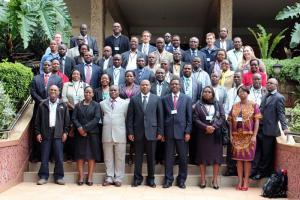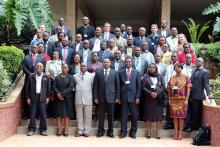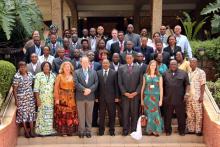WHO Regional Workshops on Costing National Health Programmes held in Nairobi
3-14 December 2012, Nairobi -- Two regional workshops on the “United Nations OneHealth Costing Tool”, developed by UN agencies (UNAIDS, UNDP, UNFPA, UNICEF World Bank and WHO) were held in Nairobi.
The two workshops organized in response to request from countries to harmonize the content, format and outputs of existing costing tools were held for 11 Anglophone and Francophone countries (Kenya, Malawi, Tanzania, Zambia, Zimbabwe, Benin, Burundi, Djibouti, Cote de D’Ivoire, Togo and Mali) in the region, with participants drawn from WHO, Ministries of Health (MOH) staff, partner agencies and identified potential consultants.
The objective of the training workshops was to build capacity in the use of the OneHealth costing tool among selected WHO and MOH staff, partner agencies and identified potential consultants, and to develop a pool of resource persons who will support countries in the region to use the OneHealth costing tool to plan and cost their programmes and plans, as part of overall national health sector strategic planning.
The OneHealth tool is a new software tool designed to strengthen health system analysis, planning, costing and financing scenarios at the country level. The purpose of the tool is to assess public health investment needs in low and middle income countries. It incorporates UN epidemiological impact models to determine achievable health gains and is unified in that it combines disease program and health system planning, supports planning, costing, budgeting, impact analysis and financial space analysis all in one tool. It has incorporated planning and costing tools that have been used previously by the UN agencies including: Marginal Budgeting for Bottlenecks (MBB), WHO integrated Health Technology Package (iHTP), the Child Health Cost Estimation tool, the FamPlan and the UNFPA Reproductive Health costing tool.
The content of the workshop covered capacity building on OneHealth and how the software supports integrated planning processes; using OneHealth to inform the development of a costed plan for health system components, such as Human resources for health, and Logistics; integration across programmes and system components into a broad national health plan; using OneHealth to assess health system implications of a programme plan (e.g. a 5-year maternal and child health strategy) and discussions on the need for a common assessment of health system implications to assess the need for harmonizing health sector objectives, and set priorities; setting priorities by developing and comparing alternative scenarios for planning, examining the financial space implications and the expected reduction in disease burden (mortality and morbidity); outputting costs into a budget format, including, for instance, GFATM and GAVI/HSS proposals.
The tool is currently being applied in several countries in the African region to support planning and costing processes, with additional countries identified to use it support planning and costing efforts at country level for effective utilization of funds.
At the end of the training, participants will be expected to:
Apply the OneHealth Tool to estimate the cost for health activities in different country contexts; be able to generate basic costing projections for components of a national health sector strategy;
Use OneHealth to assess health system implications of a programme plan/ strategy;
Develop and compare alternative scenarios for planning, examining the financial implications as well as the expected reduction in disease burden (mortality and morbidity)
The identified countries will be expected to develop or update their Maternal and Newborn Health (MNH) operational plans or National Health Strategic Plans (NHSP) with the view of using the one health costing tool to cost them.
WHO Regional Workshops on Costing National Health Programmes held in Nairobi
For further information, please contact:
World Health Organization, Kenya
4th floor ACK Garden House.
1st Ngong Avenue off Bishop Rd.
P.O. BOX 45335, 00100 (GPO)
Nairobi, Kenya.
Email: wrkenya [at] ke.afro.who.int (wrkenya[at]ke[dot]afro[dot]who[dot]int)





